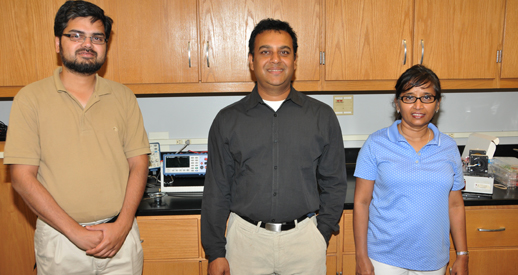
DSU Presents First-Ever Innovation Grants to Selected Faculty Members
8/27/13
Five faculty-driven projects have been named to receive funding as part of the University’s first-ever PRIDE 2020 – Innovation Grants awards.
The five projects were selected from among 29 submitted proposals by DSU faculty. The selected projects – awarded $20,000 each – were determined to be the top proposals that advance the priorities and goals of the institution’s strategic plan.
|
|
The following faculty members and their projects have been awarded Innovation Grants:
- Dr. Mohammed Khan, assistant professor of physics (PI); Dr. Mukti Rana, assistant professor of physics (co-PI); and Dr. Nandita Das, associate professor of business (co-PI) – “Next-Generation Sensors for Improving Human Health and Urban Air Quality: A Technology-Driven Business Model for Young Entrepreneurs.” The project entails a prototype greenhouse gas sensor technology for environmental applications, developed indigenously at DSU’s engineering laboratories. It will be transformed into a marketable product through a model business plan developed by DSU’s College of Business team. The goal of the project is to expose students to the critical stages of research conducted in the laboratories and to the aspects of commercialization of such technologies through interdisciplinary collaboration in a unique academic setting.
- Dr. Gary Holness, assistant professor of computer science (PI) -- “Managing Indoor/Outdoor Transitions in Autonomous Robot Wheelchairs.” A number of efforts in the robotics and machine perception research communities have pursued the idea of an autonomous wheelchair as a mobility solution for those with both physical and perceptuo-cognitive impairments. The research project will aim to address issues concerning the development of autonomous wheelchairs that transition between outdoor-to-indoor and indoor-to-outdoor navigation. It will involve the assembling of a multidisciplinary team comprised of students from computer science, engineering and business who will design, develop, manage and advertise the project during a one year period of performance.
- Dr. Ladji Sacko, associate professor of foreign languages (PI); and Dr. Raymond Tutu, assistant professor of history and political science (co-PI) -- “Using Study-Abroad Exchanges to Enhance Global Learning at DSU.” This project’s primary objective is to implement best
practices for integrating study abroad opportunities for students and faculty, with specific courses and coursework, into a more comprehensive and structured globalization of the DSU campus.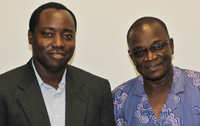 (L-r) Dr. Raymond Tutu and Dr. Ladji Sacko.
(L-r) Dr. Raymond Tutu and Dr. Ladji Sacko.
- Dr. Daniela R. Radu, assistant professor of chemistry (PI); Dr. Cheng-Yu Lai, associate professor of chemistry (co-PI); Dr. Yuri Markushin, senior research scientist (co-PI); Dr. Chaoying Ni (co-PI, University of Delaware) -- “Affordable Solar Thin-Film Technologies Based on Sustainable
Materials.” The project will contribute to establishing the foundation for a strong solar program at DSU by demonstrating novel nanoparticles precursors to thin film photovoltaics (PV). The project’s ultimate goal is to create a prototype of roll-to-roll printed solar cells on flexible substrates. The nanoparticle technology provides the advantages of fast, atmospheric pressure deposition, a lightweight substrate and a thin, inexpensive absorber layer, each of which decreases the cost and the weight of the final solar cell or module.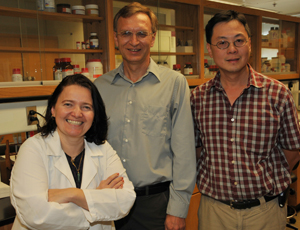 (L-r) Dr. Daniela R. Radu, Dr. Cheng-Yu Lai and Dr. Yuri Markushin.
(L-r) Dr. Daniela R. Radu, Dr. Cheng-Yu Lai and Dr. Yuri Markushin.
- Dr. Hacene Boukari, associate professor of physics (PI); Dr. Essaid Zerrad, professor of physics (co-PI) – “Interdisciplinary Computational Laboratory (ICL).” This lab will be established to engage DSU undergraduate and graduate students in diverse STEM disciplines through computational, physical and mathematical modeling. ICL will be used
to assemble appropriate scientific codes and media-oriented software for STEM teaching and to develop computational capabilities for interdisciplinary research. ICL will emerge as a resource for teaching the basic principles of physical sciences, the foundations of engineering and their applications in other scientific disciplines such as biological sciences. It will increase participation of STEM students who will be trained in job-oriented computational and analytical skills, allowing them to be well-positioned to enter a competing multidisciplinary job market. Moreover, the efforts that will ensue will promote research collaborations among DSU researchers.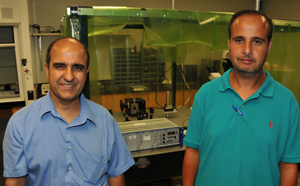 (L-r) Dr. Hacene Boukari and Dr. Essaid Zerrad.
(L-r) Dr. Hacene Boukari and Dr. Essaid Zerrad.


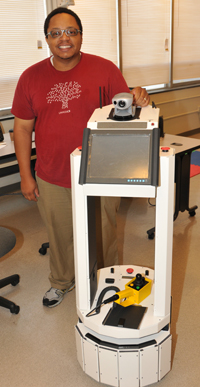 Dr. Gary Holness, shown with one of his robots.
Dr. Gary Holness, shown with one of his robots.